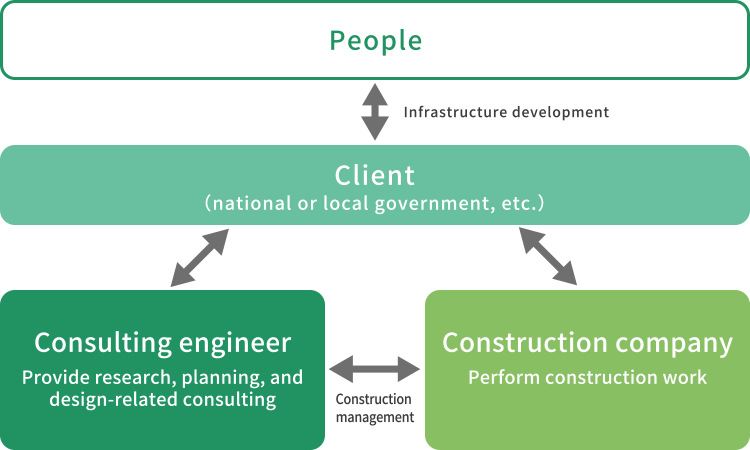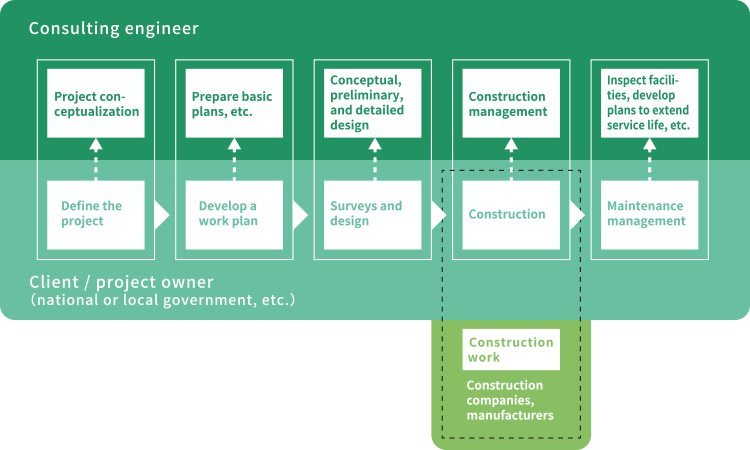- TOP
- Our Business
- What is a Consulting Engineer ?
 What is a Consulting Engineer ?
What is a Consulting Engineer ?
Infrastructure forms the backbone of our lives; it is what allows us to function from day to day. Here, we will explain the job of the engineering consultancy, a team of consulting engineers and other specialists who play an essential role in creating the infrastructure that makes our lives more convenient.
The role of the consulting engineer
What is a consulting engineer ?
Consulting engineer support their clients by providing comprehensive guidance and advice on all aspects of infrastructure construction.
All of us rely on infrastructure to live and work safely, conveniently, and comfortably. Roads, railways, ports, airports, water and sewerage systems, rivers, dams, parks, power supply facilities, communication facilities, waste management facilities, public utility buildings, structures and various other systems are all examples of infrastructure. In general, infrastructure is created by three main parties: the client who owns the project (often an entity such as a national or local government), the consulting engineer, and the construction company.
How the consulting engineer fits into the team
Consulting engineer provide a wide range of services throughout the life cycle of the construction project, including research, planning, design, construction management, and maintenance management. As the client's technical advisor, the consulting engineer helps to deliver safe and high-quality infrastructure that the public needs. The consulting engineer creates the designs that construction companies follow when performing construction work.

Consulting engineer must maintain a high level of technical expertise in order to perform their jobs, as their work significantly impacts the quality and cost of the facilities to be built. Consulting engineer play a key role in helping to resolve the growing number of problems we face in society today as infrastructure ages, natural disasters become more frequent, and global environmental problems worsen.
The consulting engineer's job
What consulting engineer do
As mentioned above, consulting engineer work side-by-side with their clients, providing guidance throughout the life cycle of the construction project.
Construction projects proceed in phases, starting with project conceptualization, followed by planning, research, design, construction, and management. In Japan, orders for the designing and building processes are placed separately in principle. Construction companies handle the building process, while construction-related companies handle the planning, surveying, and design. Engineering consultants fall under the latter category of construction-related companies.
Workflow
Now, let's take a look at the workflow to see the stages of a consulting engineer's job.
- 1. Receive a request from the client (national or local government, etc.)
- 2. Define the project (basic policies, project outline, and the structure of the plan)
- 3. Develop a work plan (a construction plan based on drawings and topographical data)
- 4. Conduct research (traffic volume studies, water quality surveys, river occupancy surveys, etc., to preserve the environment and assess environmental impact)
- 5. Create the design (the overall blueprints required for construction)
- 6. Manage construction (construction work is performed by the construction company or contractors)
- 7. Manage maintenance (inspections, maintenance management plans to extend service life, repair plans, repair work, etc.)
The above is a general outline of a typical workflow.

What makes consulting engineer so appealing?
(1) Our jobs are essential to society and support people's lives.
We depend on infrastructure such as electricity, gas, water, roads, and railways in our daily lives. Many of us take infrastructure for granted because it is so commonplace. However, were it not for the work of consulting engineers, our lives would be much less convenient.
(2) We help to create infrastructure that lasts into the future.
We aim to create safe and secure communities, and it is our greatest joy to see that the infrastructure we have helped to build will remain with people for years to come. The best part of the job is being able to contribute to society through long-lasting initiatives that pre-empt issues, such as through the construction of facilities that protect people from future disasters.
(3) The wide range of work and high level of specialization makes for a rewarding career.
As was mentioned above, the consulting engineer is involved in many phases of the construction project. This means that it is a very specialized field that requires advanced and wide-ranging expertise. Large-scale construction projects can span years or decades, so the sense of accomplishment that we feel when this time and effort finally pays off is another highlight of the job.
How to choose a consulting engineer
It is no exaggeration to say that the quality of infrastructure depends on the quality of the consulting engineer. Japan's Act on Promoting Quality Assurance in Public Works (the Quality Assurance Act) states: "In assuring the quality in public works, in view of the fact that the quality of surveys […] and designs for public works play an important role in quality assurance of public works, based on the purposes of the preceding paragraphs, […] the quality of surveys and designs for public works must be secured." In other words, it is extremely important to choose an engineering consultancy known for providing quality services to oversee the surveys and designs.
Therefore, price is not the only key factor when hiring a consulting engineer. One should also consider whether the company has tried-and-true technical capabilities.
The following two methods are typical when selecting a consultant.
Proposal Method
The proposal method is a method in which multiple companies submit proposals based on a specific theme, and the client selects the consulting engineer best suited to the task from among them. The tender may be open to all bidders or restricted to a set of selected companies. As for how the proposals are evaluated, this method emphasizes the content of the proposals and the bidder's technical capabilities rather than the price, so high quality can be expected.
Comprehensive Evaluation Bidding Method
In contrast to the proposal method, which emphasizes the technical aspects of the project, the comprehensive evaluation bidding method takes both price and technical aspects into account. Bidders are awarded points based on price and technical aspects, and these points are combined to obtain a comprehensive evaluation score. The bidder with the highest evaluation score and whose bid price matches the budget is given the contract. This method selects the most advantageous bidder for the client.
In closing
As you can see, consulting engineer are integral to the development of infrastructure.
Going forward, consulting engineer are expected to become even more essential and in-demand as progress is made on new public works and urban development projects, and as clients' needs continue to diversify.
The consulting engineer's mission is "enriching life through engineering" —using the power of technology to build the backbone of society, with the aim of improving people's lives. As Japan's first engineering consultancy, CTI Engineering has been working under this philosophy for over 70 years. A proud leader in the industry, we have partnered with the government to support Japan's development, actively engaged in activities with academic associations, and helped to improve the status of engineering consultants in Japan.